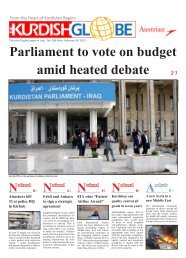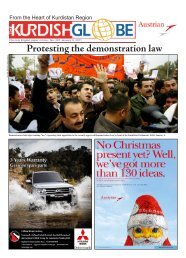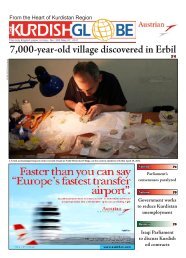Erbil: The host city of sports t ournaments - Kurdish Globe
Erbil: The host city of sports t ournaments - Kurdish Globe
Erbil: The host city of sports t ournaments - Kurdish Globe
You also want an ePaper? Increase the reach of your titles
YUMPU automatically turns print PDFs into web optimized ePapers that Google loves.
<strong>The</strong> <strong>Kurdish</strong> <strong>Globe</strong> No. 276, Saturday, October 09, 2010 14<br />
Chopy and an<br />
album in English<br />
Singer Chopy Fattah anne<br />
nounced that she is close<br />
to publishing an album in<br />
English. <strong>The</strong> album conse<br />
sists <strong>of</strong> seven songs, one<br />
<strong>of</strong> which she has videoed<br />
in Beirut. A number <strong>of</strong><br />
British and Dutch compane<br />
nies have invited Chopy<br />
to perform concerts in<br />
their countries, but she<br />
hasn’t replied yet, saying<br />
she is too busy at the prese<br />
ent time with deadlines.<br />
<strong>The</strong> <strong>Kurdish</strong> female<br />
singer said happily: “I had<br />
a year very good. I was<br />
able to finish college and<br />
receive a degree in psyce<br />
chology. I want to conte<br />
tinue studying next year,<br />
and I have dedicated this<br />
year to take some rest and<br />
work on my art; I had dele<br />
layed some <strong>of</strong> my art bece<br />
cause <strong>of</strong> my studies.” Bese<br />
sides the English album,<br />
Chopy is also working on<br />
another album <strong>of</strong> <strong>Kurdish</strong><br />
songs. This album, which<br />
is going to involve 14<br />
tracks, includes a number<br />
<strong>of</strong> <strong>Kurdish</strong> maqams.<br />
Singer and<br />
Peshmarga<br />
Hamajaza<br />
passed away<br />
Paywand Jaff prefers<br />
working behind the camera<br />
Singer Paywand Jaff anne<br />
nounced he would like to<br />
find a job at a <strong>Kurdish</strong> TV<br />
station--not as a presenter,<br />
but behind the camera.<br />
Paywand revealed that the<br />
time has come for him to<br />
think about returning to<br />
Kurdistan after spending<br />
17 years in Europe. But<br />
first he has to find a job.<br />
But he has one condition:<br />
“I cannot do any job that<br />
has no relation to my art.<br />
I don’t know any other<br />
job than art, and I have<br />
spent all my life on it.” He<br />
would like to work at one<br />
<strong>of</strong> the Kurdistan TV state<br />
tions where he can keep<br />
his ties with art. He rejecte<br />
ed the idea <strong>of</strong> working as<br />
a presenter, as “it is hard.”<br />
Instead, he said: “I want<br />
to be behind the cameras<br />
to create programs with<br />
new ideas.” Paywand anne<br />
nounced that he is putting<br />
the final touches on a new<br />
album.<br />
“Scenarists are afraid <strong>of</strong> writing”<br />
Necessity has pushed Naje<br />
jim Hogir to become an<br />
artist with multiple pr<strong>of</strong>esse<br />
sions. Hogir has worked<br />
as an actor <strong>of</strong> theater and<br />
drama, a scenarist, a directe<br />
tor, and also a poet.<br />
“If you notice, you easie<br />
ily see gaps in the fields<br />
<strong>of</strong> art. I have tried to fill<br />
some <strong>of</strong> the gaps,” stated<br />
Hogir, who has nearly 40<br />
years <strong>of</strong> acting experience.<br />
“I always believed that we<br />
shouldn’t remain on the<br />
stage, acting in theaters,<br />
but also needed to have<br />
TV and cinema works. But<br />
there we had a shortage <strong>of</strong><br />
scenarist and directors.”<br />
Concerning scripts, Hoge<br />
gir admits there are compe<br />
petent story writers among<br />
Kurds. But the problem,<br />
he said, is that they do not<br />
dare to write scenes for theae<br />
ater or film. He explained<br />
that stories and novels sell<br />
better and are more pr<strong>of</strong>ie<br />
itable for writers when<br />
printed in books. “I don’t<br />
say I am a good scenarist<br />
or a good director. This is<br />
something people have the<br />
right to decide. But what I<br />
have done is try to fill in<br />
the gaps,” said Hogir.<br />
As a poet, Hogir works<br />
Hamajaza Ali, a super popue<br />
ular <strong>Kurdish</strong> singer, passed<br />
away on October 1 after a<br />
long battle with cancer.<br />
His national and revolute<br />
tionary songs, which still<br />
are remembered, played a<br />
great role in the Peshmarge<br />
ga struggle in the 1970s<br />
and 1980s. “Ho Kaki<br />
Peshmarga…shorishgery<br />
qaraman…nawy pirozi<br />
toya bota wirdi sar zime<br />
man,” a refrain <strong>of</strong> his most<br />
popular song, was chanted<br />
at the funeral in his homete<br />
town <strong>of</strong> Suleimaniya. <strong>The</strong><br />
refrain translates to “Oh<br />
brother Peshmarga…you,<br />
the Brave Revolutionie<br />
ist…your name is always<br />
remembered.”<br />
Hama Jaza had nearly<br />
200 diverse songs, includie<br />
ing national and love songs<br />
as well as Maqams, and<br />
he wrote most <strong>of</strong> his own<br />
lyrics. His albums were<br />
for a different purpose. Alte<br />
though he has written poe<br />
ems since the early 1970s,<br />
none have been printed or<br />
published in newspapers.<br />
His poetry skills appeared<br />
when his lyrics were used<br />
for songs. He said 30 to<br />
35 singers have made 120<br />
songs out <strong>of</strong> his lyrics,<br />
including artists such as<br />
Braym Khayat, Tara Rase<br />
sul, Bahjat Yahya, Adnan<br />
always forbidden by Iraqi<br />
authorities at that time;<br />
however, they quickly<br />
spread around Kurdistan.<br />
<strong>The</strong> funeral was attended<br />
by a large number <strong>of</strong> fans,<br />
artists, and <strong>of</strong>ficials, and<br />
his death dominated all<br />
local newspapers and TV<br />
channels. In <strong>Erbil</strong> on Octobe<br />
ber 3, the KRG Ministry <strong>of</strong><br />
Culture held a special cere<br />
emony to express respect<br />
for Hama Jaza. <strong>The</strong> Minie<br />
istry’s award <strong>of</strong> respect,<br />
this year under the name<br />
“Ho Kaki Peshmarga,”<br />
was awarded to a number<br />
<strong>of</strong> veteran <strong>Kurdish</strong> artists.<br />
Hama Jaza born in 1949<br />
and joined the Peshmarga<br />
at age 18. He continued in<br />
a double job as both Peshme<br />
marga and singer, and left<br />
behind four girls and two<br />
boys.<br />
Karim, Niyan Abdullah,<br />
and Wushiyar Hamasalih.<br />
But practicing his multe<br />
tiple skills simultaneously<br />
brought Najim Hogir more<br />
difficulties than benefits,<br />
he noted.<br />
His recent work includes<br />
a scene for a short film<br />
named “Komak” (or Help),<br />
which tells about the Halae<br />
abja tragedy, and another<br />
short film named “Apora”<br />
(or Crowd), which tells<br />
about a statue a crowd is<br />
gathering around. In one<br />
scene, when removing the<br />
curtain, the statue says:<br />
“With money you have<br />
spent on this ceremony tode<br />
day, you could have served<br />
me while I was alive so as<br />
I could have lived a few<br />
years longer and served<br />
you.”<br />
Contributions to “<strong>The</strong> <strong>Kurdish</strong> <strong>Globe</strong>” entertainment page come from the weekly art section <strong>of</strong> “Hawler Newspaper.”
















